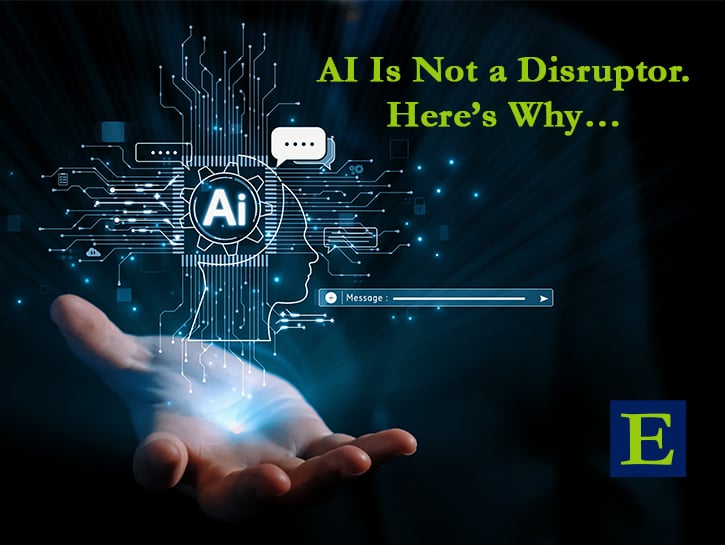

July 30, 2025
Why AI Is Not a Disruptor, Despite Everything You’ve Heard
Buzzwords. Few people can resist them. It's easy to get swept up in the latest jargon and "click me, pleaaase" terminology, especially when it comes to AI. Headlines are constantly shouting about AI being the ultimate "disruptive technology," set to completely overhaul everything we know. But let’s pump the brakes for a second. While AI's capabilities are indeed accelerating at an incredible pace, that kind of framing might be missing a crucial point.
As the experts at the Clayton Christensen Institute wisely remind us, technology alone rarely disrupts markets. Think about it: a powerful new tool in isolation doesn't change the game. What truly creates disruption are the innovative new business models that emerge, built strategically around that technology.
We understand this distinction deeply. It's not just about having the latest AI—it's about how that AI is intelligently integrated within a well-thought-out framework, solving real problems, addressing market needs and ultimately delivering true value that goes beyond mere technological capability.
“Clay Christensen, a valued advisor to ECLARO, has deeply influenced our thinking, especially around new technologies,” says ECLARO Co-Founder Paul Sheridan. “New technologies often spark fear because they challenge the status quo—but it’s the role of businesses and entrepreneurs to harness innovation as a force for productivity, not disruption for disruption’s sake.”
So, What Does Disruption Really Mean?
Christensen's theory of disruptive innovation says, in essence, that a technology truly becomes disruptive not just by being new, but by enabling a new business model. This new model typically starts by serving customers who were overlooked or at the lower end of the market—think simpler, cheaper or more accessible solutions. Over time, these innovations grow to challenge established leaders.
“On the flip side,” Paul Sheridan notes, “if a new technology primarily improves existing products or services within current markets, that's what we call a sustaining innovation. It makes what's already good even better.”
Now, where does Artificial Intelligence fit into this? As AI stands today, it's generally not inherently disruptive. Instead, it's proving to be an incredibly powerful sustaining innovation. AI helps us enhance what businesses are already doing, enabling us to achieve more and do it faster. What it doesn't do, on its own, is fundamentally redefine how value is created and delivered from the ground up.
AI as Sustaining Tech: The Real Role
So, if AI isn't inherently disruptive, what exactly is it? Think of AI as a powerful sustaining technology. It significantly boosts human productivity, making existing processes better and faster.
“For instance, AI excels at things like refining resume parsing, speeding up how we match talent to opportunities, powering predictive models and optimizing client outreach,” ECLARO Co-Founder Tom Sheridan says. “These are tangible, valuable gains, but they're about enhancement, not reinvention.”
AI's strength lies in making the work we already do far more efficient. It helps us streamline operations, rather than prompting a complete rethink of the work itself. But while AI can expertly sort through vast amounts of data, it fundamentally cannot build trust, offer genuine empathy or spot the nuanced potential that truly sets a candidate apart. Relationships still matter.
What Could Be Disruptive? The Business Model
They say a carpenter is only as good as their tools, but tools also need the right carpenter to create something of note. True disruption doesn't come from the tool itself, but from how that tool is leveraged. Businesses that strategically harness AI to address previously unmet needs—perhaps by offering entirely different pricing structures, access points or delivery models, for example—are the ones that pose a real competitive challenge.
No matter what the specific application of AI is, however, there is a constant: The most successful models will be those that reinforce and elevate human connection, rather than attempting to replace it. Because when it comes down to it, human connection still matters most.
Human Connection: Say It with Us…the Right People are the Answer
At ECLARO, we’ve always believed that people are the differentiator. You don’t just hire for skills. You hire for alignment, potential, culture fit—and all of these require human insight, connection and interaction.
AI can suggest. A recruiter can advocate.
AI can connect. But only humans can build relationships that lead to opportunity.
This is why thinkers like Julia Freeland Fisher of the Christensen Institute emphasize social capital as a vital form of equity. AI can scale access, but relationships scale trust.

AI is not the disruptor. Disconnection is.
We must wield AI with intention—not to reduce people to profiles, but to expand what people can achieve. At ECLARO, our mission is built on this balance—using innovation to elevate performance while keeping the human connection at the center of everything we do.
“That really gets to the heart of the issue,” adds Tom Sheridan. “We shouldn't fear AI. But we should be clear-eyed about how we use it—and about what we might lose if we forget what truly drives long-term success.”
Because no matter how smart any algorithm gets, the greatest success comes when people hire people—when the Right People hire the Right People—and relationships and that human touch remain our most powerful technologies.
Key Takeaways:
|
Read more:
- Five Ways to Think About AI, Jobs, and Your Future—Right Now
→ Breaks down how AI intersects with career planning, job markets, and mindset shifts. - It’s Summer: Hiring Trends, AI Skills, Unemployment Impact, and More Hot Topics We’re Talking About
→ Covers emerging AI skills, market movements, and employer needs across industries. - U.S. Workforce. AI Use. Job Offers. What’s Up and Down This Week
→ A real-time snapshot of how AI is actually shaping (or not shaping) hiring trends. - Industries That Will Have the Highest Talent Shortages by 2030
→ Explains where human capital will be most needed—even as automation grows. - Stop Hiring Humans. Try Start Hiring Humans
→ A fresh take on the real human qualities companies should prioritize—AI or not.
